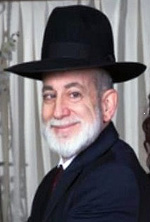By Rabbi Yaakov Marks

SAN DIEGO — Moshe faced a monumental and daunting task; the building of the Mishkan (the portable tabernacle). Enormous amounts of gold, silver, and bronze, had to be procured and fashioned. Many varieties of dyed wool, linen, goat hair and ram skins needed to be processed according to complicated and intricate specifications. Tremendous amounts of acacia wood needed to be collected, hewed and precisely cut. All this was to be done with an untrained workforce. The future of the Jewish people was dependent on the construction of this building. They had pushed G-d aside for the golden calf and now the Mishkan would be the invitation for G-d to return to dwell amongst them once again. If built improperly G-d’s glory might not return.
Moshe gathered the entire congregation and asked them to make the necessary donations. He appealed for anyone who could work to step forward and join him in this important endeavor. He asked that anyone who had the desire to come forward and collaborate on this formidable project. A rush of excitement spread throughout the camp and the people mobilized.
The princes were taken aback by Moshe’s leadership. The princes were normally consulted first and then they would go and deal with and organize the people, but now they were bypassed and called together with the general population. They were insulted and withdrew. They sat by quietly waiting for Moshe to fail thinking that Moshe would eventually require their help. The task was too big to be completed without them. In the end, they would be called on to furnish the missing money and supplies. Suddenly a message was circulated. No more supplies or work was needed. The financial goal had been surpassed and the quota of workers had been fulfilled. The princes were shocked and were now humbled by their behavior. There was nothing left for them to do except to bring some precious gems and fine oil.
What were the princes thinking? Why did they believe the job could not be done without them? Why did Moshe implement his daring plan?
The princes had a small amount of haughtiness in them and they wanted to be in charge and tell the people what to do. They wanted to take control. People working in such an environment lack the proper motivation and without passion only do whatever is required of them and no more. The princes were right that according to their form of management the Mishkan would not have been built without them.
A true leader, Moshe knew that if he gave the people control and empowered them to be partners in the construction of the Mishkan their passion and commitment would be limitless. An inspired nation is hard to stop. True leadership is giving control not taking control. A great leader creates leaders, not followers. Anyone on any level has the potential to be a leader. If we would work with people and not demand that people work for us, we would be more successful and we would have a positive impact on people’s lives.
May we have the humility to be good leaders. May we blessed with the courage to give control and not take it. May we merit to inspire greatness in all the people we meet.
*
Rabbi Marks is a certified health coach who may be contacted via ahealthyrabbi@gmail.com.